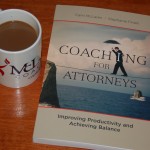 I wrote the following article for Source Point Training Company’s (SPT) weekly newsletter. SPT is the company that provided me with my coach training. (www.sourcepointtraining.com):
I wrote the following article for Source Point Training Company’s (SPT) weekly newsletter. SPT is the company that provided me with my coach training. (www.sourcepointtraining.com):
I am a performance coach, working with lawyers and other professionals to attain higher levels of productivity while maintaining overall balance. Early in my coaching career, I realized I could gain more exposure if I wrote articles. I wrote articles on the tools and practices that had been most impactful for my clients. I submitted the articles to several legal magazines and got published. It was surprisingly easy. Most magazines are looking for content and coaching is a hot topic right now in business.
My book – Coaching for Attorneys: Improving Productivity and Achieving Balance (www.mclarencoaching.com/coaching-for-attorneys) — was published by the American Bar Association and released last January. It took me about two years to complete the book. I wrote it with a local practicing attorney. I did this for two reasons. First, it gave me a level of accountability from her in meeting deadlines. It also provided me someone to review everything I wrote and make sure it made sense for my audience.
It took a lot of dedication to remain committed to the project, while growing my coaching practice, caring for my children, my home, myself, my spouse and serving on my children’s school board; you know…life.
Since completing my book, many doors have opened for me. This is largely due to my efforts in marketing the book and getting reviews out there, particularly in the virtual world. My goal was never solely book sales. It has always been about bringing credibility to coaching as a resource for attorneys; and increasing my own exposure as a coach for attorneys.
Book-Writing Tips
1. Write about what you know and love.
2. Start with articles for practice and immediate payoff. Look for magazines in the industry where you coach, or pertinent to your topics.
3. If you are not coaching in a particular industry, find a specific coaching topic. Don’t just write about “coaching” – write about something specific – coaching for writers or for engineers or coaching to grow your business. Be specific!
4. No. 3 will assist you in finding a publisher. I was rejected by a number of publishing houses. The American Bar Association (ABA) picked us up because the book was about coaching for attorneys. We also found someone who knew someone in the ABA, so ask around.
5. Set specific writing goals and chunk them down to a manageable size. This one is important. A book is a large undertaking and can feel overwhelming. Setting manageable goals and patiently, persistently moving toward them can help avoid frustration and burnout.
6. Join a writing group or get a writing partner – someone who is helping with your book or writing her own so you have an accountability partner.
7. Have fun and don’t give up!






